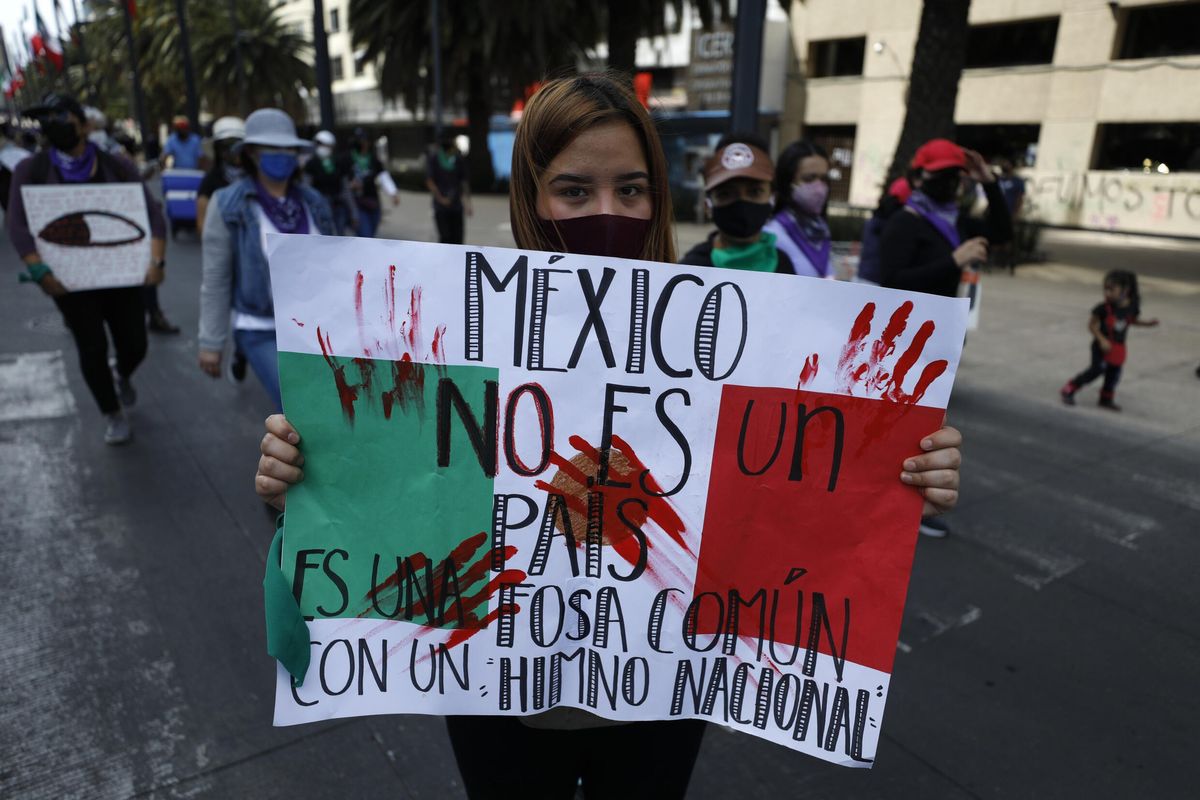Bereaved mother presses UN over Mexico femicides
Activist Andrade faced two assassination attempts while advocating for justice for her daughter and other victims
AFP
News Agency Partner
AFP is a renowned international news agency, delivering comprehensive and reliable reporting on global events, trends, and issues.

A demonstrator in Mexico City carries a sign reading in Spanish, "Mexico is not a country, it's a mass grave with a national anthem," to protest violence against women on March 8, 2021.
File/AFP
Femicides are rampant in Mexico
Activist Andrade complaints with international human rights bodies to push for progress in her daughter's case
Despite lack of progress, Andrade remains determined to see her daughter's killers brought to justice.
Norma Andrade's teenage daughter was murdered in 2001, yet nobody has ever faced justice. She is battling the impunity surrounding femicides in Mexico -- despite attacks on her own life.
"I'm 63 and what keeps me going is courage, the feeling of helplessness at not having what we should be entitled to: justice," Andrade told AFP during a recent visit to Geneva.
She was in the city to meet with United Nations representatives, including from the rights office and UN Women, non-governmental organisations and foundations, calling for more international attention to Mexico's extremely high rate of femicides.
She was also presenting a documentary chronicling her struggle, "Norma -- A Quest For Justice", produced and directed by Brigitte Leoni.
Andrade became a human rights activist in February 2001 after her 17-year-old daughter Lilia Alejandra Garcia Andrade was murdered in Ciudad Juarez, a city on the US border where thousands of women and girls have been killed since 1993.
Lilia Alejandra, whose body was found seven days after she went missing, had two very young children of her own, who were left to Andrade to raise.
The documentary focuses on Andrade's relentless struggle over more than two decades for justice for her daughter and other victims, and facing two assassination attempts herself in the process.
The film also focuses on the staggering numbers of femicides in Mexico, where the UN estimates that around 10 women are killed per day.
"The problem is widespread," Andrade said.
"We want justice for Alejandra and all the Alejandras in Mexico."
The activist said her goal was "also to make known our demands regarding the failings of the Mexican state".
Andrade tirelessly denounces irregularities, omissions and negligence during investigations into femicides, as well as corruption within the system.
And she is fighting for relatives of victims to be granted a special status, urging public policies to support children orphaned by femicide.
Andrade said she was not very optimistic things would change despite the arrival in June of Mexico's first female president, Claudia Sheinbaum, who has vowed to combat violence against women and strengthen women's rights.
"I hope, but without much hope", she said.
Andrade has reason to be sceptical.
She has been waiting for 23 years to see progress in bringing her daughter's killers to justice.
Frustrated with the lack of progress, Andrade filed a complaint with the Inter-American Commission on Human Rights, which in 2022 ordered Mexico to speed things up, said one of her lawyers, David Pena.
With no palpable progress, the complaint over Mexico's lacking action in the case was this year moved to the Inter-American Court of Human Rights, which is due to hold a hearing and issue its ruling next year.
Over the years, DNA tests have established links between Lilia Alejandra's killing and other femicides, Andrade said.
But in 2018, "the Mexican state said that everything that had been done for 17 years was useless," Pena said.
Mexico maintains that a person now detained was one of the aggressors, he said, stressing he had seen no proof of the man's guilt or innocence.
While waiting for proceedings to advance in Mexico, Pena hopes that the case before the Inter-American Court "will serve as an example", particularly in terms of protecting activists.
Andrade herself was shot multiple times in a first assassination attempt in 2011 in Ciudad Juarez, forcing her to move to the Mexican capital, where she was attacked again in 2012, this time by a man wielding a knife.
She now has protection measures in place.
These attacks could "have originated from groups or authorities in the state of Chihuahua who want to silence us", Andrade said.
"I would be lying if I said I'm not afraid," she admitted.
"Fear paralyses you, so it was difficult to learn to live with fear without letting it paralyse me."
But she insisted she would not give up her quest for justice, having made a promise to Lilia Alejandra in her coffin.
"I promised her that I would not rest until her murderers were in jail."







Comments
See what people are discussing